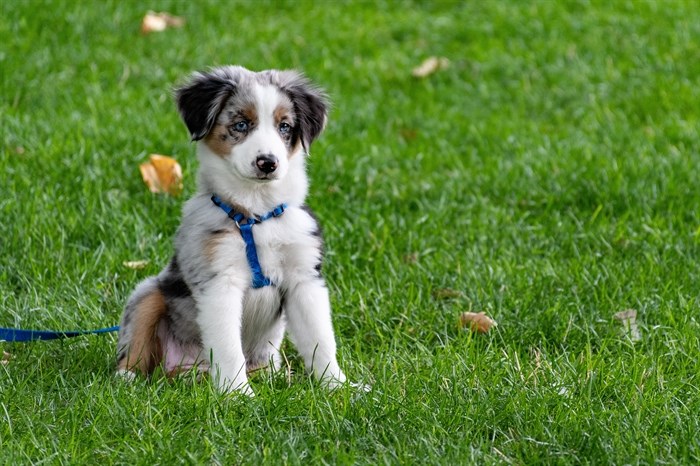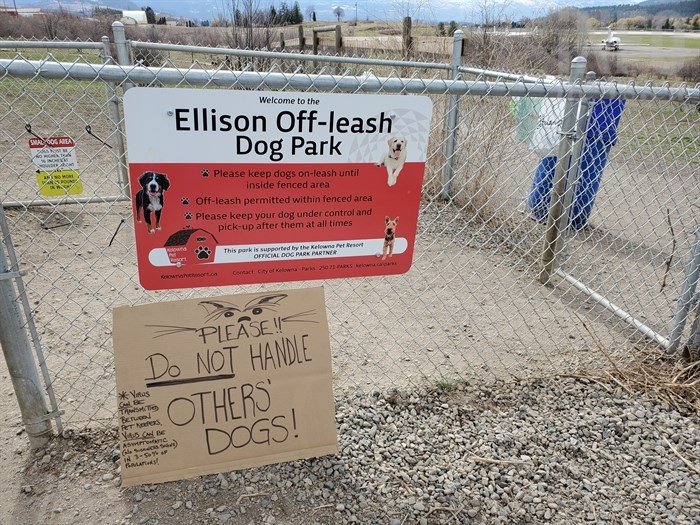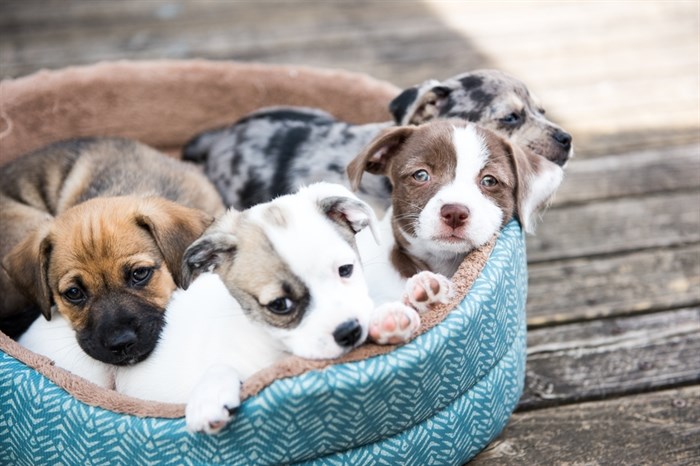
Image Credit: PEXELS
April 26, 2020 - 7:00 AM
If you have adopted a dog to keep you company through the pandemic, isolation could cause you to miss some crucial steps in raising a puppy — socializing and training.
Even if you find an open dog park you might have trouble finding a willing companion to allow your new pup the crucial rites of getting to know other dogs and other people.

A hand-written sign at the Ellison off-leash dog park in Kelowna, discouraging patrons from petting dogs due to COVID-19.
(BRIE WELTON / iNFOnews.ca)
Here are six things you need to know about raising a new dog — and some special considerations through isolation — from Kelowna celebrity dog trainer Brad Pattison.
Socialization
Although your first instinct at this time may be to avoid going outside at all costs, Pattison warns that you shouldn't put off the socialization component of your dog's training for too long.
"Dogs are very social. So any socializing a dog can do is beneficial," he said.
Under current circumstances, this could be dropping your dog off for a playdate or sleepover with their "dog friend." If you know someone with a dog, set up a date in the backyard for your fur babies at either home.
If dogs are unable to socialize with other playmates they can become depressed, Pattison said.
"Therefore dogs do need to have an opportunity to see one another," he said.
The amount of time they can go without socialization varies from dog to dog, but Pattison said some can show signs of sadness as early as one week. If you're noticing depression in your dog, it may be time to find them some friends.
Giving your dog alone time

Image Credit: PEXELS
Life is all about balance, and it's no different for dogs.
Although owners currently have plenty of time to devote to their dog while stuck at home, once normal activities such as work and school resume, a dog suddenly being left alone causes problems.
"It’s really important for people to give the dog some alone time so it starts to understand that it’s okay to be alone,” said Pattison.
"Crate train your dog, give it two hours alone in the crate while everyone is in the house, and the dog just learns to be alone and not interacted with all the time."
Otherwise, a dog unaccustomed to being alone may destroy furniture, bark for long periods or suffer from separation anxiety.
Humanizing your dog

Image Credit: PEXELS
"One of the things that people really do need to focus on is not humanizing a dog when they adopt it,” said Pattison. This includes giving a dog human food, putting it in a stroller and allowing it to go up on the furniture or sleep in your bed. Treating your dog like a human can be detrimental to the dog, and even fatal.
Pattison explained that some actions, like putting an able-bodied dog in a stroller, can affect its happiness because dogs would much prefer to walk.
Allowing dogs to have certain human privileges can also make them aggressive if they are denied those privileges later.
"I've dealt with hundreds of dogs in my career that have claimed the couch or the bed as their territory," Pattison said. He has experienced countless incidences of dogs biting and lashing out when they are forced off the couch or the bed.
"At the end of the day, it's the dog that loses its life," Pattison said. "It's so sad that I see so many dogs being euthanized, because it's our mistakes."
Dogs should be given their own spaces, and treated like what they are — a member of the family, but a dog nonetheless.
Training Expectations

Image Credit: Shutterstock
One of the biggest myths in the dog world is that some breeds are smart, while others are not, Pattison said.
"Every dog is brillant, every dog is smart,” he said. “Give that dog an opportunity to learn, and don’t just expect that dog is going to learn everything in a very short period of time.”
In reality, it's normal for a dog to take a few months to learn all of the skills and behaviours it's being taught. Another mistake owners make is using the label “rescue” as an excuse for their dog’s poor behaviour.
“People will never have a high expectation of their dog, cause they always say it’s broken, or it’s not able to,” explained Pattison. “They use the rescue word as a reason not to discipline, not to train, not to have an expectation.”
Pattison stresses that a dog that has been adopted from the SPCA or a rescue organization is just as capable of learning as any other dog, if given the proper time and attention.
Repeating commands

Image Credit: PEXELS
“When people request a dog to sit, they may end up saying it five or six times,” said Pattison. “Now if the dog starts to respond on that sixth time, that means the dog is ignoring them for the first five.”
This can pose a significant risk to the dog. For example, in a situation where a dog is about to run out onto a busy road, the owner needs it to stop immediately. If it is used to listening to the fifth or sixth command, by the time they clue in, it may be too late.
It's important to reduce the number of times a command is given, in order to ensure that the dog will comply immediately.
Bribing your dog
Not everyone agrees but Pattison is a stickler on not using treats to train dogs.
"One of the things I always stress to people is don’t use any bribery tools,” said Pattison. “Food or treats is a typical way of bribing a dog to do something, but it’s not creating a bond with the dog.”
Building a bond with the dog creates an understanding that it belongs with a family, not to a family, Pattison added.
Anyone needing guidance with dog training and looking to develop specific skills can access Pattison's free online pet training videos on his Facebook page.
During the pandemic, Pattison has provided multiple videos featuring his own dogs, giving specific instruction for trainers at home.
Pattison also urges anyone with questions to reach out to him, either by commenting on the video or messaging him personally.
To contact a reporter for this story, email Brie Welton or call (250) 819-3723 or email the editor. You can also submit photos, videos or news tips to the newsroom and be entered to win a monthly prize draw.
We welcome your comments and opinions on our stories but play nice. We won't censor or delete comments unless they contain off-topic statements or links, unnecessary vulgarity, false facts, spam or obviously fake profiles. If you have any concerns about what you see in comments, email the editor in the link above.
News from © iNFOnews, 2020